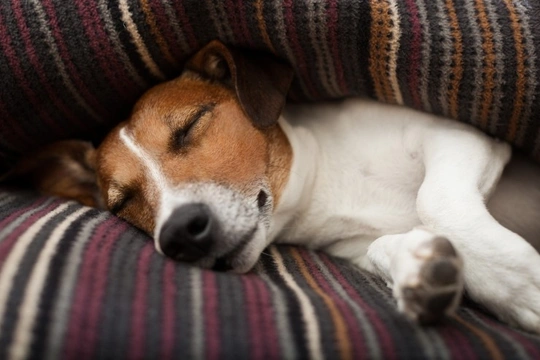
How to help a restless dog to sleep at night
Dogs are creatures of habit, which thrive on knowing that they have a set routine for each day, and that they will be fed, walked and generally know what to expect at certain times of the day. Most dogs will settle down to sleep through the night after they have settled in and got past the puppy stage where everything is new and exciting, and don’t need to toilet every few hours.
However, some dogs do seem to suffer from insomnia to some extent, or be rather restless sleepers – or apt to wake up easily during the night and have problems getting back to sleep.
If your dog seems to take a while to settle down at night or you hear them wake up and move around regularly during the night, they may need a little help – or to have their routine fine-tuned to be more in line with their needs, which may change as they get older.
In this article, we will look at some of the factors that can affect how well your dog sleeps, and share some tips on things you can try and change to help your restless dog to sleep easy. Read on to learn more.
Toilet habits
One thing that is guaranteed to disturb your dog’s sleep or wake them up in the night is if they need to go to the toilet. If this is the cause of your dog’s inability to sleep at night, there are several steps that you can take to try to reset your dog’s routine in this respect, which should always include offering your dog the chance to go out just before bed, and doing this at around the same time each night.
When you feed your dog will also partially dictate when they need to go to the toilet, so make sure that your dog doesn’t have their final meal within a couple of hours of bed time, and don’t give your dog lots of treats and snacks in the evening either.
When and how you walk your dog
All dogs need exercise, and if your dog isn’t getting enough, this can also cause them to be restless and not sleep well, as they will be full of energy. This is particularly common in very active and lively breeds like the Border collie if all of their needs are not met.
Making sure your dog gets enough walks and that the activities they perform is a match for their energy levels is one of the best ways to help your dog to sleep – but when you walk your dog can have an impact as well as how. If your dog is only walked once a day – even if this is a very long walk – and the walk takes place in the morning, your dog is likely to relax and doze during the day afterwards, which can make it harder for them to sleep at night.
Try splitting their long walk in half and taking them for a second walk in the late afternoon or evening, to avoid your dog dozing during the day and then being full of beans at bed time.
Feeding times
When you feed your dog has an impact on when they will need to toilet, as mentioned earlier on, so it is wise to ensure that your dog’s last meal is not too close to bed time, to avoid them needing to go to the toilet during the night.
However, if your dog is hungry when they go to bed they won’t sleep well either, so ensure that your dog’s food portions are divided into two or three meals that are staggered throughout the day, with the last one between two and four hours before your dog goes to bed for the night.
Where your dog sleeps
If your dog’s bed or the room that they sleep in is uncomfortable or otherwise not great, your dog will not sleep well. One of the biggest causes of sleep discomfort for dogs during the winter is being too cold, as many people have their home’s heating off overnight.
The humans remain toasty warm under their duvets, but if your dog’s bed and the room it is in is cold and/or your dog has fine or thin fur, they will get cold too.
Consider if changes in where your dog sleeps or the environment they sleep in might fix the issue.
Outside stimulus
Noise and activity outside will often wake a dog up, which may mean barking or simply pacing around and watching things through the window. If you live in an area that has a lot of activity going on at night normally, most dogs will get used to this and tune it out over time.
However, if your dog is very reactive to things outside and this wakes them up at night, you might want to look at moving your dog’s bed to a quieter room, or taking steps to reduce the impact of external stimulus
Sleep aids
Playing quiet music during the night for your dog might help them to sleep, and if they seem restless and anxious, using a DAP diffuser or collar might help your dog to settle down and be more restful.
Health and aging
As dogs reach maturity and old age, their sleep patterns may start to change – this might mean that they sleep more or less, or that their normal routine begins to get a little bit erratic. Talk to your vet about age-related brain changes in your dog, and find out if there is anything that you can do to support your dog in their old age and help them to establish a new sleeping routine that suits both of you.



